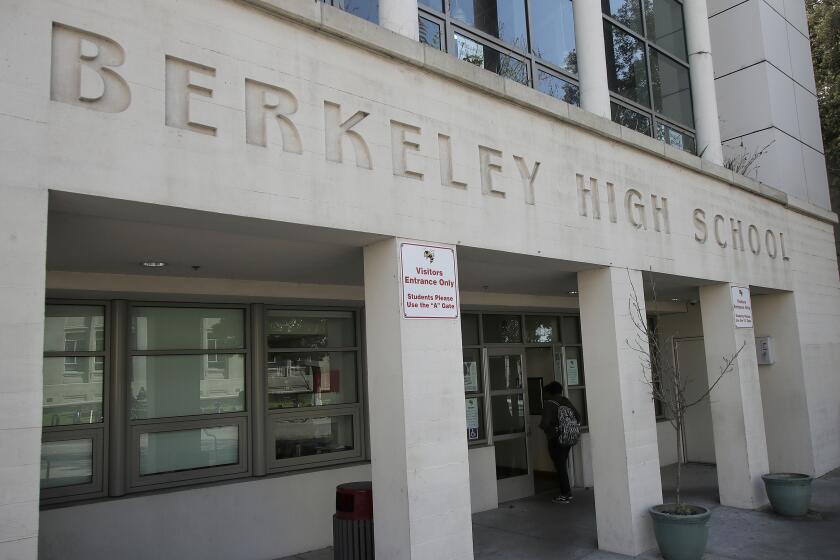Academic Bill of Rights? Oh, wise up
WITH SEPTEMBER upon us, it’s time to reflect on that perennially popular back-to-school activity, Bash the Professors.
According to David Horowitz’s book, “The Professors: The 101 Most Dangerous Academics in America,” American universities are dominated by “a shocking and perverse culture of academics who are poisoning the minds of today’s college students with ... hatred of America ... and support for America’s terrorist enemies.” His crusade against “radical academics” is not, alas, a lonely one.
By coupling his overheated rhetoric with a seemingly respectable campaign for “academic freedom,” Horowitz has managed to snooker quite a few students and politicians into supporting his agenda.
Horowitz’s website, discoverthenetworks.org, laments that most professors hold liberal political views, and he urges greater ideological “diversity” on faculties. On his Students for Academic Freedom website, he asks students to report “abuses” of academic freedom by professors, and state legislatures to mandate that public universities comply with what he calls the Academic Bill of Rights.
Horowitz’s manifesto has superficial appeal. It prohibits ideological discrimination, highlights “the uncertainty and unsettled character of all human knowledge” and asserts that “academic institutions ... should maintain a posture of organizational neutrality with respect to the substantive disagreements that divide researchers.”
What’s wrong with this, you ask?
First, the so-called Academic Bill of Rights is full of nonsense, albeit cleverly conceived and carefully disguised. Ironically, Horowitz and friends have now adopted the very line of argument the right criticized most savagely during the “culture wars” of the 1980s: creeping relativism!
Think for a minute about the document’s claim that universities should be neutral “with respect to the substantive disagreements that divide researchers.” Really? Plenty of things might be said to divide researchers, but should universities be neutral between, for instance, astrophysics and astrology, or evolution and creationism?
Universities aren’t neutral marketplaces in which all ideas should be presumed equal, but rather, institutions to foster knowledge. And despite their supposed lack of ideological diversity, most U.S. universities have robust disciplinary norms for distinguishing between persuasive analysis and sheer dogma, and between sound theories and those unsupported by facts. That’s why students come here from all over the world -- even from countries where a lot of people really hate liberalism.
The second thing wrong with the Academic Bill of Rights is that it’s merely a smokescreen for the McCarthyite agenda beneath the lofty rhetoric.
If Horowitz and company truly cared about diversity, you’d expect them to champion racial and gender diversity as well as ideological diversity. Instead, they focus mainly on “exposing” and denouncing liberal professors who allegedly penalize conservative students and colleagues.
A typical Horowitz cause celebre: a Colorado student whose professor allegedly gave her an F when she refused to agree that George W. Bush is a war criminal. When critics took a close look, though, it turned out that the student actually got a B, that she had misrepresented the assignment and that the professor was ... a Republican.
The real agenda behind this so-called bill of rights has nothing to do with fostering intellectual pluralism and everything to do with marginalizing or eliminating academics who deviate from the right-wing party line.
The right-wing assault on supposedly liberal universities appeared to have run out of steam after the ‘80s, but it revived after 9/11. Capitalizing on increased anxiety about national security, Horowitz and his ilk were able to start denouncing the academics they disliked as not merely liberal but pro-terrorist “sympathizers ... of Osama bin Laden.”
Last week, they insisted that universities be purged of liberals and “improved to serve national security,” and they urged students to “strongly criticize ... the continued presence of liberal and secular professors.”
Oh, wait -- whoops! Those quotes were from -- respectively -- Ayatollah Abbasali Amid Zanjani, the hard-line Islamist president of the University of Tehran, and Iranian President Mahmoud Ahmadinejad.
Silly me, getting my militant conservative Islamic extremists mixed up with my militant conservative Judeo-Christian extremists! Though now that I think about it, they seem to have an awful lot in common.
*
More to Read
Start your day right
Sign up for Essential California for news, features and recommendations from the L.A. Times and beyond in your inbox six days a week.
You may occasionally receive promotional content from the Los Angeles Times.






